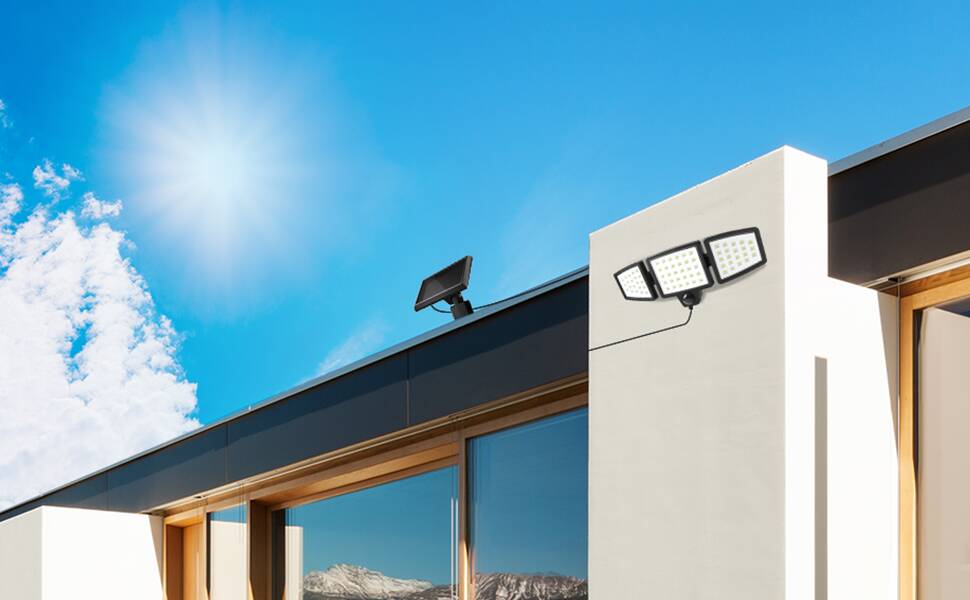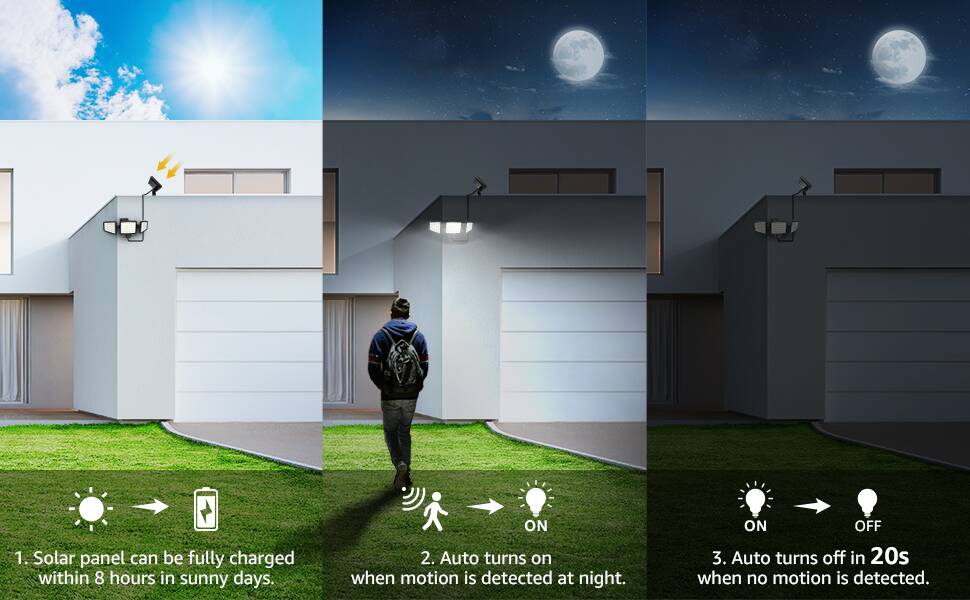When you’re in the market for solar flood lights, you need to look at more than just the price. Expensive doesn’t mean better, and cheap doesn’t automatically equate with poor quality. Solar security lights consist of several parts, including solar panels, sensors, fixtures and casings. When you want to buy solar flood light, look at what the manufacturer uses in its design and what kind of lumens output it generates.
How to Choose LED Solar Flood Lights
Solar Light Panels Type, Wattage, and Size
A considerable aspect of solar flood lights is the solar panel, as it collects the solar energy, changes it into electricity and stores that energy in the battery. When it becomes dusk, or the sky becomes really dark, it gives the light the power it needs to turn on. There are three things to look for in the solar panels – type, wattage and size.
Type
- There are three kinds of solar panels you can use:
- Amorphous solar panels – These panels have the lowest efficiency levels, around 10%, and are used mainly to change low-power electronics (cell phones, for example). The panels are found in inexpensive, lower-power solar lights.
- Monocrystalline solar panels – These are the most effective solar panels, with an efficiency range of 15% to 21%. However, they are very costly. Powerful solar lights tend to use monocrystalline solar panels.
- Polycrystalline solar panels – These have a 16% cell efficiency and are less expensive to make. What makes these panels different from other panels is that the solar panels come in a dark blue color. The monocrystalline and polycrystalline panels are installed on commercial buildings and houses where large solar systems are desired. These panels have a high cell efficiency and are seen with powerful solar lights.
Wattage
- The wattage is the most important solar panel measurement. It demonstrates the amount of power the panel generates when the conditions are right. For instance, a 10W solar panel will produce 10 watt-hours of electricity each hour. The more powerful the light is, the higher the wattage panel needs to be to produce the light. A 1.5-watt solar panel can generate several hundred light lumens; bigger lights need 10 to 20-watt solar panels.
Size
- A solar panel’s size is dependent on the amount of power the light has and the panel’s material. Monocrystalline solar panels of a thin-film solar panel design generate the same power amount as it does from the smaller panel. Before you buy solar lights, consider the area it’ll be installed in and if it’ll get enough sunlight. Will there be enough area for the solar panel to be installed if you want a high-power floodlight?
Solar Flood Light Fixture and Casings
Outdoor floodlights are exposed to the elements – wind, rain, snow, ice, etc. Therefore, you must make sure that the lighting is covered in a weatherproof casing.
Build Materials
- Casings – Casings of floodlights comprise primarily two materials – aluminum and plastic. Most high-power floodlights are made with aluminum casings to give the parts inside the best possible protection from the outside elements. Cheaper floodlights use plastic but don’t always have the quality protection aluminum does. Manufacturers use durable plastic for their housing to ensure water damage and extreme temperatures. Be sure to do your homework. Even if a manufacturer uses aluminum, it doesn’t matter if it will not withstand the elements.
- IP Ratings – An important element to keep in mind when looking at a fixture’s durability is its IP rating. The rating shows the amount of protection a fixture has from water and dust. For outdoor solar lights, you want rating protection of IP65.
- Mounting Hardware – There are several kinds of solar flood lights, such as pole-mounted lights and ground-mounted lights. See what kind of mount is warranted for your area of installation. Some manufacturers offer an option to buy different kinds of mounting hardware.
- Cable Length – You also want to consider a fixture’s cable length – the cable that attaches the fixture to the solar security light. You also need to consider the length of the area the lighting will be installed. If a cord is not long enough, you can buy extension cords. However, the longer the cable is, the more it affects the solar floodlights.
Solar Flood Light Brightness and Power
Lumens and Watts
Lumens measure a fixture’s light output and indicate how bright the fixture will be. Watts measures the amount of work the electricity does in a second. For instance, 100W of energy can light 100W for 60 minutes.
When looking at the brightness of a solar flood light, look more at the lumen rating, not the wattage. Each type of bulb produces different lumens. LEDs are three times more efficient but consume a similar amount of energy that Halogen bulbs produce.
Special equipment is necessary to get the lamp’s right lumen measurement. However, many manufacturers do not use the tool to get their lumen rating, so the ratings they list aren’t always accurate. For not-so-reliable brands, this is particularly important. In most cases, this is what you can expect for lumens in certain products:
- Smaller, all-in-one fixture lights – 100 lumens
- Motion-activated solar flood lights – 300 to 600 lumens
- High-power outdoor solar flood lights – 1,000 to 3,000 lumens
The average solar-powered floodlight will have a lumen of 300 to 800.
Color Temperature – This relates to the color appearance a lamp produces; or the light of color the lamp generates. This measurement is in Kelvins. Solar security lights should have a kelvin rating of 5,000K to 6,500K.
LED Solar Floodlight Sensors
Sensors play an integral role in solar lighting products because they help in battery conservation and turning on the light when it’s time. The two important sensors are motion sensors and photosensors. What do they do?
Motion Sensors
- As the name implies, the light will turn on when the sensors detect movement around a certain area. There are three typical types of motion detectors – active sensors, passive infrared sensors, and combined sensors. The PIR sensor is usually manufactured in the motion-activated solar light and won’t pick up random movements such as windblown objects or tree branches.
Photosensors
- A prudent feature of a solar floodlight is the photosensor (or the dusk-to-dawn sensor). This sensor detects when the light is fading, and dark is imminent, turning the light on automatically when it reaches the set level of darkness. When the morning comes, the light will turn off, saving energy and battery. If a solar floodlight does not have this sensor, you will have to turn on and off the light automatically. When looking for solar flood light with this sensor, you must do your homework and read the description. If the manufacturer claims it’s a dusk-to-dawn light, you can feel assured it’s got a photosensor.
Do not buy any solar flood light without a photosensor or motion sensor, as this wastes the energy that’s been stored. Manually turning it on and off defeats the goal of solar lighting.




